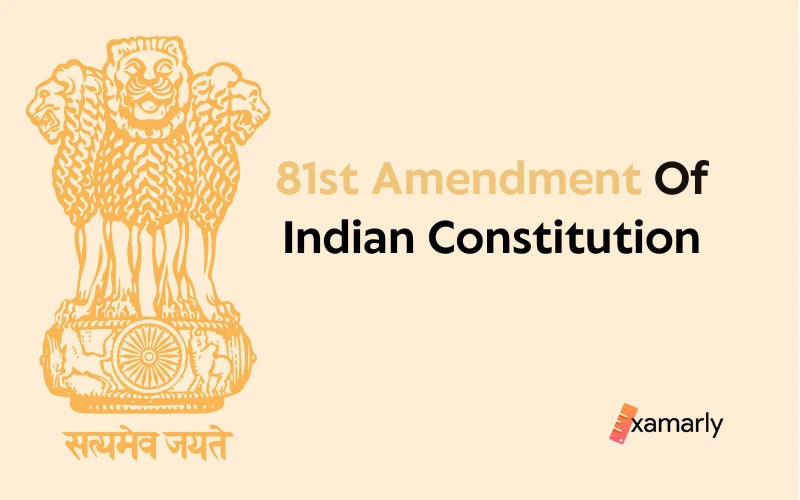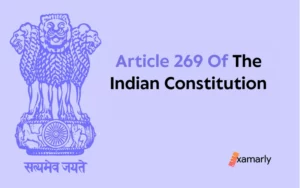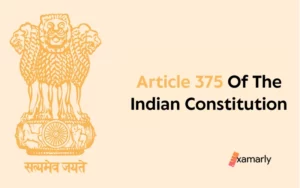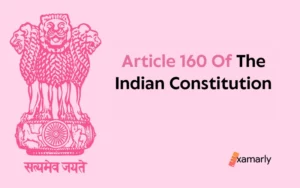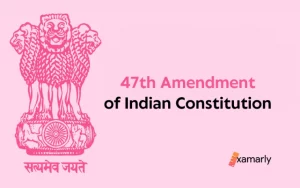The Constitution (Eighty-First Amendment) Act, 2000 is the formal name of the 81st Amendment of the Indian Constitution. Protecting the reservation for SCs and STs in the backlog of vacancies was the amendment’s primary goal.
Read this article further to learn more about the changes done by the 81st amendment of the Constitution of India. Also, you will understand the reason behind the need for such an amendment and much more information.
Overview of the 81st Amendment of the Indian Constitution
On 9 June 2000, the 81st amendment of the Indian constitution came into effect. When this amendment was passed, Atal Bihari Vajpayee was the prime minister. This modification was passed in the Fiftieth Year of the Republic of India.
This constitutional amendment modifies article 16 of the Indian Constitution.
A new clause (4B) was added to Article 16 of the Constitution of India by the 81st Amendment Act of 2000, after clause (4A).
The new provision stated that the unfilled SC/ST positions from a year that were held over to be filled in the following year in accordance with Article 16 would be taken into consideration separately for openings in the following year.
Additionally, the previously mentioned list won’t be used to meet the 50% criteria for that year.
Statement of Objects and Reasons
Before August 29, 1997, the positions set aside for members of Scheduled Castes and Scheduled Tribes that could not be filled through direct recruitment due to a lack of candidates from those groups were referred to as “Backlog Vacancies.”
These vacancies were handled as a separate group. Moreover, they were not included in the 50% reservation cap.
According to the ruling of the Supreme Court of India in the case of Indra Sawhney v. Union of India, the percentage of positions to be filled on the basis of reservations in a year, including carried-over reservations, should never go above 50%.
The entire number of yearly reservations for the Scheduled Castes, the Scheduled Tribes, and the other Backward Classes combined reached forty-nine and a half percent, and the total number of vacancies to be filled up in a year could not exceed fifty percent, making it difficult to fill the “Backlog Vacancies” and conduct Special Recruitment Drives.
As a result, on August 29, 1997, an Official Memorandum was released to implement the Supreme Court’s decision and end the Special Recruitment Drive. It stated that the 50% limit would apply to both current and “Backlog Vacancies.”
Numerous organizations, including members of parliament, made a representation to the central government to defend the interests of the Scheduled Tribes and the Scheduled Castes. This happened as a result of the unfavorable consequences of the aforementioned ruling from August 29, 1997.
As a result of reviewing the situation and taking into account various comments, the government decided to modify the constitution.
Accordingly, any unfilled vacancies of a given year, which are reserved for filling up in the following year, shall be treated as a separate class of vacancies to be filled in the following year or years in accordance with any reservation made under clause 4 or 4a of article 16 of the Constitution.
In addition, such vacancies shall not be considered for calculating the ceiling of 50% of vacancies in the year they are filled. During that year, there were a number of vacancies were reserved.
This constitutional amendment would allow the State to resume the situation that existed before August 29, 1997.
That Bill aims to accomplish the aforesaid object.
Important Provisions
Amendment of article 16- In Article 16 of the Indian Constitution, the following clauses shall be added in place of clause (4A):
(4B): There is nothing in this article that prevents the State from treating any unfilled vacancies of a year that are reserved for filling in that year in line with any provision for reservation made under clauses (4) or (4A) as a separate class of vacancies to be filled in any future year or years.
Such a class of vacancies shall not be taken into account along with the vacancies of the year in which they are being filled up for calculating the ceiling of 50% reservation on the total number of vacancies for a particular year.
See Also – 82nd Amendment Of Indian Constitution
Conclusion
The 81st Amendment of the Indian Constitution went into effect on 9 June 2000. This constitutional amendment modifies article 16 of the Constitution of India. This gave the state the authority to treat the unfilled reserved vacancies from one year as a separate class of vacancies to be filled in the following year or years.
Such a class of vacancies must not be added to the vacancies of the year in which they are filled in order to determine the year’s overall vacancy reservation ceiling of 50%. This modification, in essence, eliminated the 50% cap on reservations for backlog vacancies.
In the interest of further readings:
FAQs
What is the purpose of the Indian Constitution (81st Amendment), Act, 2000?
The sole purpose of unfilled vacancies of a year reserved for SC/ST kept for filling in a year as per Article 16, shall be considered separately for filling vacancies in the succeeding year, and the previous list will not be considered for filling the respective year’s 50% quota.
What is article 16(4b) of the indian constitution?
As per Article 16 (4b), nothing contained in this article hinders the State from considering any unfilled positions in a year that are reserved for filling in that year in accordance with any reservation made under clauses (4 or 4A) as a separate class of positions to be filled in any subsequent year or years. For determining the maximum 50% reserve on the total number of vacancies for a given year, this type of vacancy shall not be considered along with the vacancies of the year in which they are filled.
What year was the 81st Amendment passed?
On June 9th,2000, the 81st Amendment to the Indian Constitution came into force.
What is the 81st Amendment of the Indian Constitution?
In the year that marked India’s fifty years as an independent republic, the 81st amendment to the constitution was passed. This amendment to the constitution makes a change to article 16 of the Indian Constitution. It states that the previous year’s vacancy list will not be used to complete the 50 percent quota of the corresponding year and that the unfilled SC/ST vacancies from that year that were kept for being filled the following year in accordance with Article 16 will be taken into account for filling vacancies in the subsequent year.


